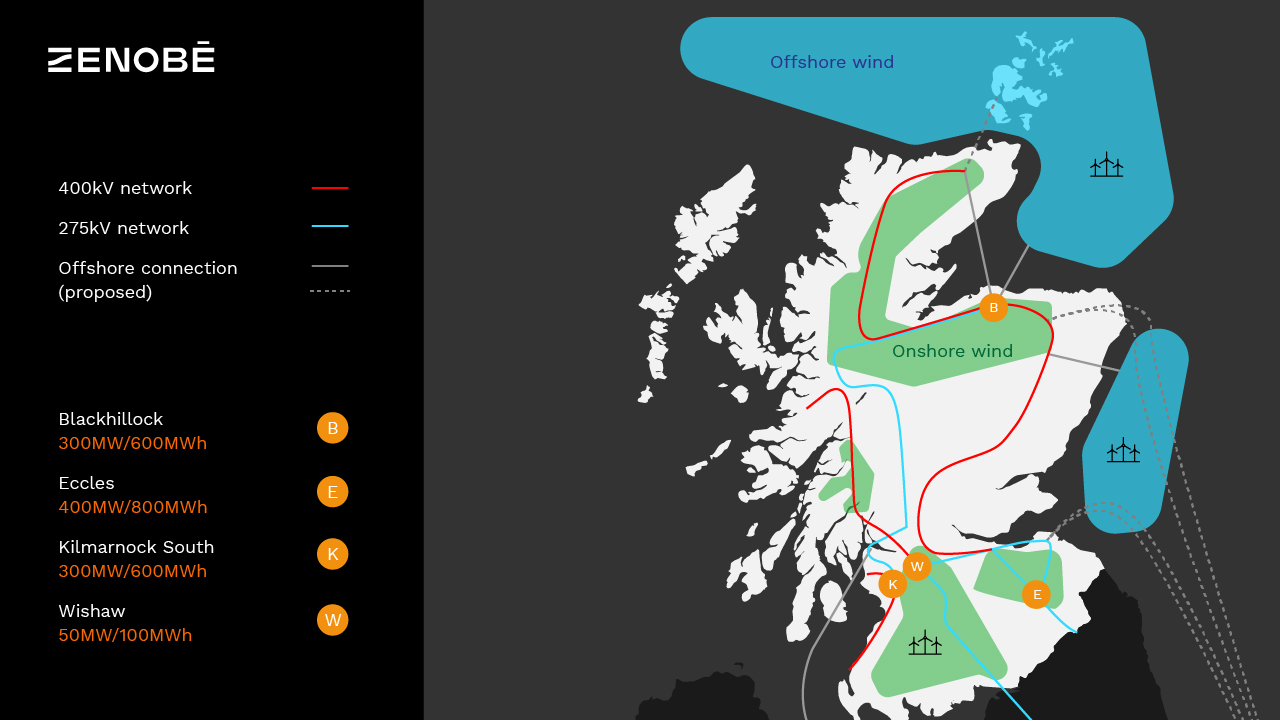Zenobē begins construction on pioneering battery storage projects totalling £750 million in Scotland

As featured in Bloomberg, Scotsman, Renewables Now, Renews.biz and MSN.
Zenobē, the EV fleet and battery storage specialist, today announces it has begun construction on pioneering battery storage projects totalling £750 million in Scotland at Blackhillock, Kilmarnock South and Eccles. This brings its total portfolio in Scotland to 1050MW / 2100MWh and equates to more than the total MWh of all grid-connected batteries operating in the UK today.
Over their 15 years of operation, the sites are forecast to save up to 11.25m tonnes of CO2 from the atmosphere, equivalent to taking >300,000 diesel or petrol cars off the road per year – equivalent to removing more than all the cars in Glasgow*. They are also forecast to lower consumers bills by over £1 billion by reducing the curtailment of windfarms over the same period.
The new projects are all contracted to provide stability services to National Grid Electricity System Operator (NGESO) to improve the reliability of the UK’s increasingly renewable power system. These are the first commercial contracts in the world to use transmission connected batteries to provide short-circuit level and inertia, essential for the grid to function efficiently as fossil fuel plants phase out. Zenobē will provide 4.4GVAs of inertia, equivalent to c. 5-10% of Britain’s requirement. The batteries will also ease network constraints by importing electricity at times of peak renewable generation. These are essential services which will contribute to the lowering of consumer bills and the UK’s acceleration towards net zero.
Short circuit level maintains system voltage during a fault. Inertia, which is derived from the kinetic energy stored in rotating turbines, prevents sudden changes in system frequency. These key grid services are usually delivered by fossil fuel powered plants. Renewable power sources do not provide these services, so to decarbonise successfully, it is necessary to find alternative, reliable sources of grid stability – not only in the UK but globally.
James Basden, Co-founder and Director of Zenobē, said:
“Zenobē is transforming the uptake of clean power, enabling the UK to become both more independent and greener in how it generates electricity. These projects are using the latest technological innovation to make renewable energy more reliable and affordable at a national scale. This is the future for how utility scale battery projects will work on every grid.
“Our projects at Blackhillock, Kilmarnock South and Eccles are world-firsts for battery storage, addressing a key, complex hurdle to the uptake of renewables in an innovative way and pushing forward our progress to energy independence and a zero-carbon grid.
At a time of increasing energy prices and the need for greater energy security, this is the type of investment which the UK needs now to drive growth, and which will enable both the country and Zenobē to become leaders in delivering the energy transition.”
Julian Leslie, Head of Networks at National Grid ESO, commented:
“NGESO is working hard to enable the UK to have a carbon free power network. Working with the industry we have developed contracts that accelerate the rapid uptake of renewable power. These contracts are part of the solution that will enable NGESO to have the ability to operate a zero carbon system in 2025.
“Investment into the use of new technologies by innovative companies like Zenobē is bringing this ambition nearer. The investment into these three major projects represents a turning point in how major grid scale battery storage can support the grid as fossil fuel generation is phased out.”
Today Scotland uses 96% carbon free generation and the rapid rollout of wind power means that the transmission network is becoming more congested, leading to the expensive shutdown of wind farms. The locations for these projects were specifically chosen to reduce this curtailment, allowing more power onto the grid, lowering bills for consumers and increasing the UK’s energy independence.
Construction at the Blackhillock site began this month with the site due to go live in H1 2024. This follows the 50MW / 100MWh battery project at Wishaw which is the first to win a constraint management contract from National Grid ESO and will be the first in Scotland to connect directly to the Transmission network when it goes live in H1 2023.
Zenobē intends to use its expertise in managing renewable power at a large scale as the basis for international expansion into new markets such as Australia and the USA with new projects planned to be announced in 2023.
– ENDS –
Notes to editors
- Renewable energy sources interact with the electricity grid differently from coal and gas plants. Fossil fuelled power plants deliver certain key grid services, such as short circuit level, reactive power, and inertia, as a by-product of their normal operations. Short circuit level maintains system voltage during a fault. Inertia, which is derived from the kinetic energy stored in rotating turbines, prevents sudden changes in system frequency. Renewable power sources do not provide these services consistently so to decarbonise successfully, it is necessary to find alternative, reliable sources of grid stability – not only in the UK but worldwide.
- Blackhillock project is 300MW / 600MWh, with Phase 1 (200MW / 400MWh) due to go live in H1 2024, Kilmarnock South is 300MW / 600MWh, with Phase 1 (200MW / 400MWh) due to go live in H2 2024, and Eccles is 400MW / 800MWh and due to go live in H1 2026.
Sources and calculations to back up comments above:
-
- Consumer savings of >£1bn reflects savings of £169m from the Stability contracts and savings of £862m from providing balancing services and constraint management to the grid and helping reduce price volatility. The £169m of consumer savings assumes that Zenobē’s batteries with stability contracts (8-10yr contract length) will avoid the use of CCGT’s, which would otherwise be out-of-merit, to provide inertia and SCL. CCGT efficiency assumed at 55% and Stable Export Limit of 35%. Average gas price over contract length assumed at £40/MWh, which is conservative considering the high price outlook for gas over the next decade. The £862m of balancing services and constraint management assumes that the assets cycle twice a day and provide a reasonable level of savings to the control room vs the alternative actions that would be taken e.g. curtailing wind for bid actions during constraints, more competitively priced offer actions than gas peakers / CCGTS.
- * These numbers were updated on 10/12/24, in-line with our most up-to-date reporting methodology. Learn more here.
For further information, please contact:
For Zenobē: zenobe@standagency.com | 07551 579135
About Zenobē Energy Ltd. (Zenobē):
Zenobē is an international EV fleet and battery storage specialist, headquartered in the UK with operations in Europe and Australasia. It has c.235 MW of contracted storage assets and 1.6GW in development in the UK which equates to c.25% market share forecast by 2026, around 25% market share of the UK EV bus sector and c.580 electric vehicles on the road globally. The company is the largest owner and operator of EV buses in the UK, Australia and New Zealand.
The company’s pioneering battery storage offering enables power grid operators to provide clean, secure and affordable power, accelerating the global transition to Net Zero energy systems. Zenobē’s fleet solution is driving the adoption of electric vehicles and reducing emissions from the transport and logistics sectors. Its ETaaS (Electric Transport-as-a-Service) solution provides fleet operators and local authorities with a full solution for a pay-per-month fee including charging infrastructure, battery replacement and award-winning software. Zenobē is also a leader in repurposing EV batteries after their first life, providing incremental power solutions to large business and the film and events industries.
For more information, please visit www.zenobe.com
